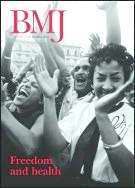--- Dedicated For Food Bloggers
 The Christmas double issue of the British Medical Journal (BMJ) highlights a new way of eating healthy.
The Christmas double issue of the British Medical Journal (BMJ) highlights a new way of eating healthy.
It features a meal called the Polymeal.
It is essentially an "evidence-based recipe" consisting of wine, fish, dark chocolate, fruits, vegetables, garlic, and almonds.
The objective of the BMJ article was to "identify a tastier and safer alternative to the Polypill."
But what is a Polypill?
So, the authors of the study tried to present an alternative that is supposedly as beneficial but tastier, than the Polypill --- the Polymeal.In 2003 Wald and Law introduced the concept of the Polypill.
The advocates of the Polypill selected six pharmacological components that by modifying different risk factors of cardiovascular disease multiplicatively might reduce the levels of cardiovascular disease in the population by more than 80 percent. In general, the medical community has welcomed the concept but questioned the potential adverse effects and costs of such an intervention.
[British Medical Journal]
What made the authors come up with such a new dietary innovation?
Based on studies, here are the possible Polymeal efficacies:
BMJ even went as far as launching a Christmas competition that aims for its readers to come up with recipes using the above-mentioned ingredients. Check it out here.
[British Medical Journal]
- Daily consumption of 150 ml of wine reduces cardiovascular disease by 32 percent.
- 114 grams of fish consumed four times a week reduces cardiovascular disease by 14 percent.
- 100 grams of dark chocolate consumed daily reduces systolic blood pressure by 5.1 mm Hg and diastolic blood pressure by 1.8 mm Hg
- 400 grams of fruit and vegetables consumed daily produced a reduction in blood pressure similar to that observed with chocolate (4.0 mm Hg systolic blood pressure and 1.5 mm Hg diastolic blood pressure).
- 2.7 grams of garlic everyday reduced total cholesterol concentrations by 0.44 mmol/l (17.1 mg/dl), corresponding to 66 percent of the reduction (0.66 mmol/l) that was found to be associated with a 38% reduction in cardiovascular disease at age 50.
- Consuming 68 grams per day of almonds produced half the reduction in total cholesterol (10 mg/dl) observed with garlic.
I encourage all my favorite food bloggers --- Radical Chef, ManangKu, Ting-Aling, English Patis, Clotilde, Ajay, and Toni --- to come up with recipes that use all or nearly all the ingredients mentioned above. These ingredients are guaranteed to make you and your family achieve improved chances against cardiovascular disease.
Other additional findings about the Polymeal:
Let me end this with a line from the Polymeal article in BMJ:
[Health Talk, Canada]
- The Polymeal is most effective for men, adding an average of 6.6 years to life expectancy, compared with men not eating the meal.
- The authors claim that eating the Polymeal will ward off heart disease among men for 9 years.
- Women also benefit from the Polymeal. Women eating the meal can expect their life expectancy to increase by 5 years and the Polymeal diet can ward off the onset of heart disease by 8 years.
Read the full text of the Polymeal study here.
"Finding happiness in a frugal,
active lifestyle can spare us
a future of pills and hypochondria."
[BMJ 2004;329:1447-1450 (18 December 2004)]
0 reactions:
Post a Comment